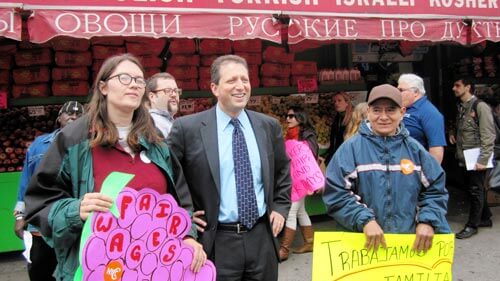Workers, community supporters and elected officials including Council Member Brad Lander have called for paid sick days at Kensington’s Golden Farm grocery store and at businesses across the city.
More than one million New Yorkers, including the workers at Golden Farm, work without paid sick days – forcing many to go to work sick to avoid losing the wages or the jobs their families rely on.
Since its opening in the late nineties, Golden Farm has fallen short on its treatment of the staff that keeps the store running. In addition to failing to provide basic benefits such as paid sick days, the store has also failed to pay minimum wage or overtime.
“Every worker deserves paid sick days,” said Martin Gonzalez, a Golden Farm worker who has worked without paid sick days for five years. “We are organizing here at Golden Farm so we don’t have to choose between our health and our pay checks every time we get sick. Getting sick shouldn’t mean risking your job. We’re proud to have the support of the community.”
“At too many New York businesses, workers must choose between their own health and putting food on the table.” said Council Member Brad Lander. “This is particularly concerning at a grocery store like Golden Farm, which we depend for a safe source for food. We want to shop at local businesses that ensure that sick workers are at home getting better, not handling the food that our families are going to eat.”
Workers and members of the community at the rally, including members of New York Communities for Change and Local 338 RWDSU/UFCW held signs with slogans such as “Sick and Fired” and “Healthy Workers, Healthy Customers.”
The workers and their supporters called for the City Council to pass a bill currently under consideration to guarantee paid sick days for workers. The proposal currently has 37 co-sponsors in the City Council, including 13 co-sponsors from Brooklyn.
“It is unbelievable that in 2012, in the greatest City in the world, there is even a debate about guaranteeing some of our hardest working – lowest wage workers a few paid sick days each year. Many hourly retail workers struggle paycheck to paycheck to make ends meet for their families. As a result, missing a day’s pay because of sickness is not an option for many of these workers and when it becomes necessary it can be devastating to a family that is already struggling to make ends meet. It’s time for the City Council to act and make paid sick days a reality for tens of thousands of working New Yorkers,” said John R. Durso, president Local 338 RWDSU/UFCW.
The bill has gained momentum following new amendments, crafted in consultation with small business owners, to provide flexibility for businesses and minimize administrative requirements; numerous small business owners have voiced their support for the bill, which will protect jobs and small businesses.
Under the proposal, workers at businesses with more than five employees would earn paid sick days – nine days for businesses with more than 20 employees, and five days for businesses with between five and twenty employees. Workers at small “mom and pop” businesses with fewer than five employees would get up to five job protected but unpaid sick days per year.
More than a million New York workers lack paid sick days, with many concentrated in food service, retail and health care. When workers come to work sick, advocates say, it threatens not only the health of those workers, but also the public health.
The rally comes as part of a week of action, held by New York Communities for Change and members of the Kensington community to draw attention to the unfair practices at Golden Farm.
The NYC Paid Sick Days Campaign is a coalition of low-wage workers, women’s rights advocates, healthcare providers, small business owners, labor unions and community organizations who believe New York cannot afford to wait for paid sick days. Paid sick days is a common sense policy for our city and our economy that protects family economy security and public health.
























